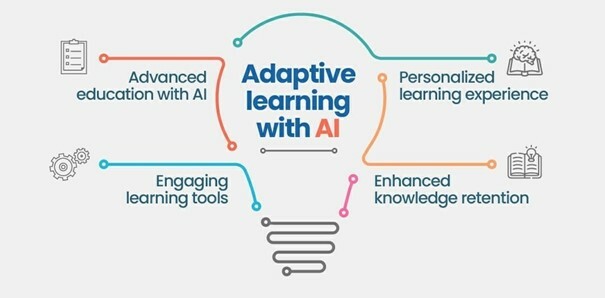e-Learning Ecologies MOOC’s Updates
Differentiated Learning Through AI-Enhanced Adaptive Learning Systems
In the evolving landscape of education, the concept of differentiated learning has emerged as a cornerstone for fostering inclusive and effective learning environments. Differentiated learning is an educational approach that recognizes and addresses the diverse needs, skills, and interests of learners by providing tailored educational experiences. This approach is an excellent example of accommodating the varied ways individuals learn and process information.
AI and Adaptive Learning: A Synergy for Differentiation
The integration of Artificial Intelligence (AI) in education has revolutionized the implementation of differentiated learning through adaptive learning systems. These AI-driven platforms dynamically adjust the content, pace, and learning strategies based on the individual learner's performance, preferences, and feedback (Figure 1). By doing so, AI facilitates a personalized learning journey, ensuring that each student receives the most appropriate and effective educational experience.
Examples of AI-Enhanced Adaptive Learning
Adaptive Learning Platforms: Platforms such as DreamBox Learning [1] and Smart Sparrow [2] are pioneering in offering adaptive learning experiences in subjects like mathematics and sciences. These platforms analyze student interactions and performance to present content that challenges their specific skill level, thereby promoting mastery learning. For instance, DreamBox Learning offers math lessons that adjust in real-time, providing deeper practice where students struggle and advancing where they excel.
Language Learning Applications: Duolingo [3], an AI-powered language learning app, personalizes education by adapting lessons to the learner's pace and performance. It uses AI algorithms to identify patterns in user answers, tailoring future exercises to address weaknesses, thereby optimizing the learning curve.
Research on AI in Differentiated Learning
Recent research underscores the effectiveness of AI in enhancing differentiated learning. A study by Maghsudi et al. [4] reviews how adaptive learning systems can significantly improve student engagement and outcomes by delivering personalized content and feedback.
Another research article by Zhao [5] discusses the potential of AI to transform traditional educational models by providing insights into learner behaviors, predicting learning outcomes, and offering recommendations for individualized learning paths.
Conclusion
AI-enhanced adaptive learning represents a paradigm shift in educational methodologies, enabling differentiated learning at an unprecedented scale. By harnessing AI's potential to tailor learning experiences, educators can meet the diverse needs of their students, fostering a more inclusive and effective learning environment.
References:
[1] DreamBox Learning: https://www.dreambox.com
[2] Smart Sparrow: https://www.smartsparrow.com
[3] Duolingo: https://www.duolingo.com
[4] S. Maghsudi, A. Lan, J. Xu and M. van der Schaar, Personalized Education in the Artificial Intelligence Era: What to Expect Next, in IEEE Signal Processing Magazine, vol. 38, no. 3, pp. 37-50, May 2021, https://doi.org/10.1109/MSP.2021.3055032.
[5] Zhao, T. AI in Educational Technology. Preprints 2023, 2023110106. https://doi.org/10.20944/preprints202311.0106.v1



Adaptive learning enables learners to work according to their needs, anytime and everywhere.